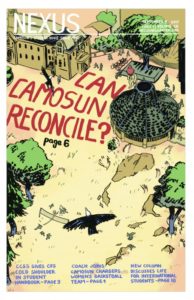Camosun College and the City of Victoria are way off base when it comes to smart city concepts.
A smart city brings together a wide range of digital technologies to transform social and working spaces, quality of life, and community services. There are many initiatives that contribute to a smart city concept, each using different combinations of technologies.
But how can we even begin to think about technological smart city initiatives if we can’t even house our students? And do bike lanes really help macro problems such as infrastructure and the housing crisis?

To have a smart city, we need educated people. To educate people, we need to provide them with housing. To further cement their learning and ignite knowledge creation, we need social spaces built for engagement. Camosun has no on-campus housing, and the college is expanding programs and traffic out to the Interurban campus. Has anyone thought of where this new influx of students will sleep?
Camosun has also missed something by having Business students drive all the way out to Interurban when so many of these students work downtown. Would it not make more sense to have them closer to downtown?
Before we fancy up our cities and campuses with technology to enhance our user environments, we should consider what makes sense. To me, that means putting people first, so we need to look at comfortable living and commuting options. Let’s get the basic necessities of Camosun students met, and then they’ll come up with educated solutions on a more technologically advanced city.
We need to consider the environmental costs of how we commute: a shorter commute reduces pollution, decreases gas emissions, and lowers traffic congestion. In the big picture, it’s a micro solution. But it’s a start.
Camosun students and employees can benefit from reducing commuting distances and times: it means more quality time with friends and family, less stress, and improved mental health and wellness.
The idea of the smart city starts with the smart community: the smart college community, the smart college employer, the smart Camosun student, and the smart Camosun employee.
The Camosun community can be a microcosm of a smart city by including housing and considering commute times. But the college needs to wise up about the smart city concept first.
